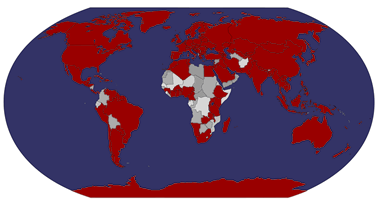One more card for today... and from such a fascinating place as well! Pat of the US kindly offered to swap with me and sent me this treat (it did take a while to reach England, but I received it eventually). Mmmmm, I'd really like to be somewhere warm and sunny at the moment, too, I'm not a huge fan of English winters. :P
Tortola is the largest and most populated of the British Virgin Islands, a group of islands that form part of the archipelago of the Virgin Islands. Local tradition recounts that Christopher Columbus named it Tortola, meaning "land of the Turtle Dove". Columbus named the island Santa Ana. The later Dutch settled and called it Ter Tholen, after a coastal island forming part of the west coast of the Netherlands. When the British took over, they altered the name to its present-day Tortola. The population of Tortola is 23,908. The principal settlement is Road Town, the capital of the British Virgin Islands.
The British Virgin Islands, then, is a British overseas territory located in the Caribbean to the east of Puerto Rico. The islands make up part of the Virgin Islands archipelago, the remaining islands constitute the US Virgin Islands and the Spanish Virgin Islands.
The official name of the Territory is still simply the "Virgin Islands", but the prefix "British" is often used to distinguish it from the neighbouring American territory which changed its name from the "Danish West Indies" to "Virgin Islands of the United States" in 1917. British Virgin Islands government publications continue to begin with the name "The Territory of the Virgin Islands", and the Territory's passports simply refer to the "Virgin Islands", and all laws begin with the words "Virgin Islands".
The British Virgin Islands consist of the main islands of Tortola, Virgin Gorda, Anegada, and Jost Van Dyke, along with over fifty other smaller islands and cays. About 15 of the islands are inhabited. The islands have a population of about 27,800.
British Virgin Islanders are classed as British Overseas Territories citizens and since 2002 have had full British citizenship. Although the territory is not part of the European Union and not directly subject to EU law, its citizens are deemed to be citizens of the EU as well.
Subscribe to:
Post Comments (Atom)



 Maroon
Maroon 










































































































































































No comments:
Post a Comment